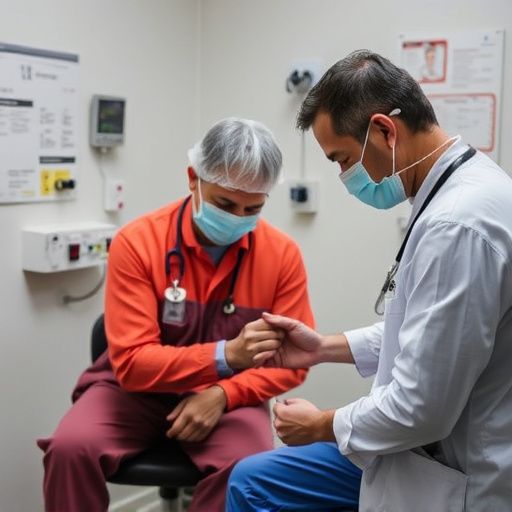Patient testimonials play a pivotal role in shaping the narrative and improvement of workers' compensation injury care. These personal accounts provide unique insights into recovery journeys, highlighting effective medical treatments, rehabilitation services, and patient support. By sharing their experiences, patients guide healthcare providers, policymakers, and claims adjusters to enhance treatment plans and compensation offerings. Testimonials offer practical guidance, encourage trust, and foster a sense of hope for injured workers, emphasizing the holistic nature of recovery. However, collecting and utilizing these stories presents both opportunities (trust building) and challenges (legal implications, privacy concerns), requiring ethical considerations and anonymization. A strategic approach to gather authentic testimonials through direct engagement and informed consent is essential to effectively showcase the positive impact of workers' compensation injury care.
Patient testimonials offer invaluable insights into the recovery journey of those who’ve experienced workers’ compensation injuries. This article explores the multifaceted role of these narratives in enhancing healthcare delivery. We delve into the positive impact of encouraging feedback, while also addressing challenges and successes in patient experiences. Additionally, we examine ethical considerations, legal implications, and strategies for gathering authentic stories, all focused on improving workers’ compensation injury care.
- Understanding Patient Testimonials: Their Role in Workers' Compensation Injury Care
- The Impact of Positive Testimonials on Injured Workers' Recovery Journey
- Uncovering Challenges and Successes: A Deep Dive into Patient Experiences
- Building Trust and Transparency: How Testimonials Enhance Healthcare Communication
- Legal Implications and Ethical Considerations in Using Patient Testimonials
- Strategies for Gathering and Sharing Authentic Injury Recovery Stories
Understanding Patient Testimonials: Their Role in Workers' Compensation Injury Care

Patient testimonials play a vital role in shaping the narrative of workers’ compensation injury care, offering insights into the lived experiences of individuals who have navigated complex recovery journeys. These personal accounts provide a unique perspective on the quality and effectiveness of medical treatment, rehabilitation services, and overall patient support during their recovery process.
In the context of workers’ compensation injury care, testimonials become powerful tools for improving healthcare delivery. By sharing their stories, patients highlight both the successes and challenges they faced, which can guide healthcare providers, policymakers, and claims adjusters in making necessary adjustments to treatment plans and compensation offerings. Understanding patient experiences fosters a more patient-centric approach, ensuring that those injured on the job receive the best possible care and support throughout their recovery.
The Impact of Positive Testimonials on Injured Workers' Recovery Journey

Positive patient testimonials play a significant role in the recovery journey of injured workers. These real-life accounts offer immense encouragement and motivation, fostering a sense of hope among individuals navigating workers compensation injury care. When an injured worker reads about another’s successful recovery, it reinforces the possibility of their own healing and return to work. Testimonials provide tangible evidence that recovery is achievable, helping to alleviate the often daunting and uncertain path ahead.
Furthermore, these narratives offer valuable insights into effective rehabilitation strategies and the quality of care received. They can guide injured workers in choosing suitable treatment options, fostering trust in healthcare providers, and promoting adherence to recommended therapies. Positive testimonials create a supportive environment, emphasizing that recovery is not just about physical healing but also about regaining control and confidence in one’s life post-injury.
Uncovering Challenges and Successes: A Deep Dive into Patient Experiences

Uncovering Challenges and Successes: A Deep Dive into Patient Experiences
In the realm of workers’ compensation injury care, understanding patient journeys is paramount. By delving into their stories, we uncover a tapestry of challenges and successes that shape recovery experiences. Many patients navigate a labyrinthine process, facing obstacles such as lengthy claim approvals, limited access to specialized care, and the emotional weight of prolonged recovery. These hurdles can significantly impact their overall well-being and return to work timelines.
However, amidst these challenges lie inspiring accounts of resilience and healing. Patient testimonials reveal transformative journeys where dedicated healthcare professionals play a pivotal role. Through personalized treatment plans, compassionate support, and innovative therapies, individuals are empowered to overcome physical limitations. These experiences highlight the impact of high-quality workers’ compensation injury care, fostering a sense of hope and empowerment among those navigating their recovery paths.
Building Trust and Transparency: How Testimonials Enhance Healthcare Communication

Patient testimonials play a pivotal role in fostering trust and transparency within the healthcare sector, especially in the context of workers’ compensation injury care. As individuals share their experiences, they provide valuable insights into the effectiveness of treatments, the quality of patient support, and overall recovery outcomes. This openness acts as a powerful tool to bridge the gap between patients and healthcare providers.
By reading about fellow patients’ journeys, current and prospective clients can make more informed decisions regarding their treatment plans. These testimonials offer a human perspective, highlighting not just medical success stories but also the emotional and practical aspects of recovery. Such transparency encourages open communication, enabling patients to actively engage in their care and fostering a collaborative environment essential for successful injury rehabilitation.
Legal Implications and Ethical Considerations in Using Patient Testimonials

When collecting and utilizing patient testimonials about their injury recovery experiences, especially in the context of workers’ compensation cases, legal implications and ethical considerations come into play. It’s crucial to understand that patient stories can be powerful tools for marketing and building trust but also carry risks if not handled properly. In the realm of workers’ compensation injury care, these testimonials might influence insurance claims, treatment decisions, and public perception of healthcare providers.
Ethical guidelines suggest transparency in sharing patient experiences while protecting individuals’ privacy and ensuring informed consent. Using anonymized or pseudonymized accounts can help maintain confidentiality. Additionally, healthcare professionals must avoid any form of manipulation or inducement to gain positive testimonials, as this could compromise the integrity of the patient-provider relationship. Adhering to these standards ensures that patient stories are used responsibly and effectively without legal repercussions in the sensitive area of workers’ compensation injury care.
Strategies for Gathering and Sharing Authentic Injury Recovery Stories

Gathering authentic patient testimonials about injury recovery experiences requires a strategic approach, especially in the context of workers’ compensation injury care. One effective method is to engage with patients directly through surveys or interviews, providing them with an open platform to share their stories. This could involve asking specific questions about their journey, including challenges faced, treatment processes, and outcomes. By creating a safe and supportive environment, patients are more likely to provide honest and detailed accounts.
Additionally, healthcare providers can facilitate the sharing of these stories by anonymizing patient data and obtaining consent for publication. This ensures patient privacy while allowing for valuable insights to be gathered and shared. These testimonials can then be disseminated through various channels, such as patient portals, social media, or dedicated recovery blogs, to offer a compelling narrative about the effectiveness of workers’ compensation injury care.














